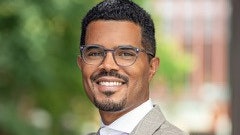By Charles H.F. Davis III, Jarell Skinner-Roy, and Brandy Jones
Yesterday morning, Leila Hamoud, a Black woman undergraduate, was arrested in her classroom at Winston-Salem State University (WSSU) by university police officers.  Dr. Charles H.F. Davis III
Dr. Charles H.F. Davis III
An unidentified staff member—who was not directly involved in the incident according to news reports—called campus police in response to an argument between the student and her professor at the professor’s request. According to Leila, who posted a since-deleted video on social media, the argument was the result of a disagreement with Cynthia Villagomez, a white Latinx professor of History, about an assignment. As the disagreement escalated – which students (who can be heard in the video of Leila’s arrest) – suggested was initiated by the professor, Leila was instructed to apologize or leave the classroom. Ultimately, when Laila refused to apologize or leave, campus police were called and placed her under arrest for what campus crime logs and court documents list as misdemeanor disorderly conduct.
This is at least the second instance this year in which a non-Black professor has been involved in treating a Black student with hostility and violence before attempting to remove them from a classroom setting. Just last month, reports and videos surfaced of now-former History professor Robert Evins Pickard shouting at a Black student at Tennessee State University (TSU). Pickard was subsequently terminated for his conduct, which TSU deemed “unprofessional” in an official statement posted on Twitter.
When taken together, and in consideration of Black student activists who have expressed how issues of harm are addressed in punitive ways, both cases are examples of the extent to which many postsecondary institutions and campus stakeholders are invested in retribution as a form of accountability. In particular, the WSSU incident is emblematic of how individual and institutional acts of retribution rely upon and utilize policing as a tactic to manage classroom incivility. It also represents the present threat of violence as a consequence for Black students who fail to comply with the authority ascribed to college and university faculty. To be sure, these logics of surveillance, control, and punishment of Black students exist in various postsecondary contexts to include predominantly white and other minority-serving institutions. They also are embodied by educators across racial identities while also targeting Black students when their behavior is deemed criminal. For instance, in March of this year it was reported that a Black professor at Perimeter College at Georgia State University called campus police on two Black students who arrived late to class. In September, the Interim Associate Vice President for Diversity and Inclusion at the University of Arizona called campus police on a ‘Disabled Black Queer’ student following a disagreement about the institutional mistreatment of Black students on campus. These recent examples only further demonstrate a lack of institutional concern for the safety of Black students. They specifically call attention to the type of institutional disregard that facilitates forcible interactions, some which have also resulted in serious bodily harm or death, between campus police and the diverse communities about whom the university so often espouses to care. Jarell Skinner-Roy
Jarell Skinner-Roy
However, to return to the arrest of Laila Hamoud, these instances taking place in institutional environments with historic missions and legacies to serve Black students and keep them safe is especially alarming. As institutions that were established to provide educational resources to Black people following emancipation and during the Reconstruction Era, HBCUs have a collective legacy and reputation for their unwavering commitment to provide Black students what historian Jelani Favors, an alumnus and the Henry E. Frye Distinguished Professor at North Carolina A&T State University, describes as a “shelter in a time of storm.” And, although it seems reasonable to excuse these instances as individual actions, the institutional response in the wake of national attention suggests WSSU is falsely equating the idea of safety with the presence and utility of police. As University Chancellor Robinson and other university officials have stated, both staff and campus police acted appropriately and in accordance with school policies and procedures to ensure the safety of students, faculty, and staff.




















